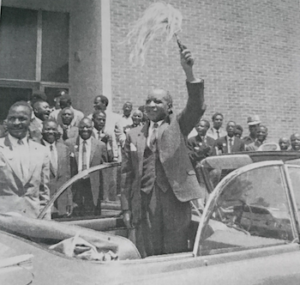
*On this date in 1964, Malawi gained independence from Britain.
This occurred almost 80 years after the European invasion and the Berlin Conference. In 1961, the Malawi Congress Party (MCP) gained a majority in the Legislative Council elections, and Banda became Prime Minister in 1963. The Federation was dissolved in 1963, and the following year, Nyasaland became independent from British rule and renamed itself Malawi, which is commemorated as the nation's Independence Day, a public holiday. Under a new constitution, Malawi became a republic with Banda as its first president.
The new document also formally made Malawi a one-party state, with the MCP as the only legal party. In 1971, Banda was declared president-for-life. For almost 30 years, Banda presided over a rigidly totalitarian regime, ensuring Malawi did not suffer armed conflict. Opposition parties, including the Malawi Freedom Movement of Orton Chirwa and the Socialist League of Malawi, were founded in exile. While Kazumu Banda was president, Malawi's economy was often cited as an example of how a poor, landlocked, heavily populated, mineral-poor country could achieve progress in agriculture and industrial development. While in office and using his control of the country, Banda constructed a business empire that eventually produced one-third of the country's GDP and employed 10% of the wage-earning workforce.
Under pressure for increased political freedom, Banda agreed to a referendum in 1993, where the populace voted for a multi-party democracy. In late 1993, a presidential council was formed, the life presidency was abolished, and a new constitution was implemented, effectively ending the MCP's rule. In 1994, the first multi-party elections were held in Malawi, and Banda was defeated by Bakili Muluzi (a former Secretary General of the MCP and former Banda Cabinet Minister). Re-elected in 1999, Muluzi remained president until 2004, when Dr. Bingu wa Mutharika was elected. Although the political environment was described as "challenging," it was stated in 2009 that a multi-party system still existed in Malawi. Multiparty parliamentary and presidential elections were held for the fourth time in Malawi in May 2009, and President Mutharika was successfully re-elected despite charges of election fraud from his rival.
Some saw President Mutharika as increasingly autocratic and dismissive of human rights. In July 2011, protests erupted over high living costs, devolving foreign relations, poor governance, and a lack of foreign exchange reserves. The protests left 18 people dead and at least 44 others suffering from gunshot wounds. In April 2012, Mutharika died of a heart attack; former Vice-President Joyce Banda took over the presidential title. In 2014, Joyce Banda lost the elections (coming third) and was replaced by Peter Mutharika, the brother of ex-President Mutharika.